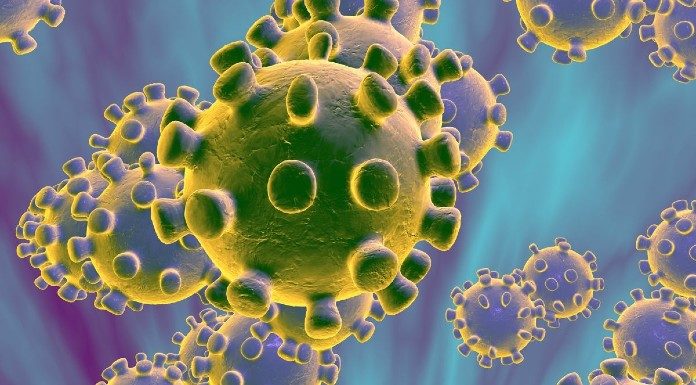There have been 77 more deaths as a result of COVID-19 in the Republic of Ireland – the biggest increase so far.
However, not all of those people passed away within the last 24 hours – some were tested posthumously.
It brings to 687 the total number of deaths here now.
There have also been a further 401 cases confirmed, bringing the total to 15,652.
In Tipperary, there were 8 more cases confirmed and the Premier County now has 300 altogether.
That represents 2% of the overall figure.
This evening’s statement from the National Public Health Emergency Team reads as follows:
The Health Protection Surveillance Centre has today been informed that 77 people diagnosed with COVID-19 in Ireland have died.
- 67 deaths located in the east, 4 in the west, 4 in the north-west and 2 in the south of the *the people included 32 males and 44 females – 1 not specified
- the median age of today’s reported deaths is 84
- 54 people were reported as having underlying health conditions
There have now been 687 COVID-19 related deaths in Ireland.
As of 1pm Monday 20th April, the HPSC has been notified of an additional 401 new confirmed cases of COVID-19 reported by Irish laboratories.
There is now a total of 15,652 confirmed cases of COVID-19 in Ireland.
The HSE is working to identify any contacts the patients may have had to provide them with information and advice to prevent further spread.
Dr. Tony Holohan, Chief Medical Officer, Department of Health, said: “Nursing homes and long-term residential facilities are a testing priority.
“In facilities with an existing cluster, all residents and staff are to be tested. In the event of a facility reporting its first case, testing of all staff and residents will take place.
“This sector remains a priority for NPHET, along with other vulnerable persons, and we will continue to implement supports and guidance on infection prevention control where required.”
Dr Kathleen Mac Lellan, Assistant Secretary Department of Health and Chair of NPHET Vulnerable People Subgroup, said; “There are 18 COVID-19 response teams across the country, each one led by senior nursing support, assisting nursing homes and long-term residential facilities. These teams have senior clinical expertise, infection prevention and control and public health input in preventing and managing clusters.”
Dr Siobhan Kennelly, HSE National Clinical Advisor and Group Lead for Older Persons, said; “There has been an ongoing process of engagement and support with the nursing home sector since the start of February.
“We know from international and domestic experience that this disease disproportionately targets vulnerable groups such as older people and those with underlying health conditions. But we also know that the Irish experience in relation to deaths in nursing homes is not an outlier in relation to the European experience.
“We continue in our efforts to support our population through this pandemic.”
Dr. Ronan Glynn, Deputy Chief Medical Officer, Department of Health, said; “Today marks the start of European Immunisation Week. In combatting the spread of COVID-19 we must not forget the impact that other infectious diseases can have on our communities.
“Vaccines have saved more lives and prevented more serious diseases – like measles and meningitis – than any advance in recent medical history.
“If your baby is due a routine immunisation, please phone your GP practice and arrange for them to be seen. The national immunisation programme is continuing during the COVID-19 outbreak and is vital to protect individual babies and to avoid outbreaks of vaccine-preventable disease.”
Department of Health’s COVID-19 Information Dashboard; providing latest case information.
Department research
Research conducted on behalf of the Department of Health shows that people are missing contact with family and friends (54%) but that 9/10 believe current measures are appropriate.
The nationally representative online survey of 1,270 adults conducted today, which is conducted twice weekly, reveals:
- people are adhering to public health messaging with the vast majority reporting actively implementing measures to stay at home (90%), practice social distancing in a queue (90%), hand washing (94%) and coughing into elbow (77%).
- for the first time people are starting to feel that the worst of the pandemic is happening now (52%) with only 26% believing that the worst is still to come.
Cases as at Saturday 18 April
Today’s data from the HPSC, as of midnight, Saturday 18th April (15,185 cases), reveals:
- 56% are female and 44% are male, with 478 clusters involving 3,139 cases
- the median age of confirmed cases is 48 years
- 2,272 cases (15%) have been hospitalised
- of those hospitalised, 306 cases have been admitted to ICU
- 4,009 cases are associated with healthcare workers
- Dublin has the highest number of cases at 7,666 (51% of all cases) followed by Cork with 1,047 cases (7%)
- of those for whom transmission status is known: community transmission accounts for 62%, close contact accounts for 34%, travel abroad accounts for 4%
Hospital statistics
| Total number of cases | 15185 | |
| Total number hospitalised | 2272 | |
| Total number admitted to ICU | 306 | |
| Total number of deaths | 642 | |
| Total number of healthcare workers | 4009 | |
| Number clusters notified | 478 | |
| Cases associated with clusters | 3139 | |
| Median age | 48 |
*All statistics measured at midnight on Saturday 18 April
Gender of patients
| Gender | Number | % of Total |
| Female | 8433 | 55.5 |
| Male | 6603 | 43.5 |
| Unknown | 149 | 1 |
| Total | 15185 |
*All statistics measured at midnight on Saturday 18 April
Age range affected
| Age Group | Number | % of Total |
| <1 | 30 | 0.2 |
| 1 – 4 | 54 | 0.4 |
| 5 – 14 | 161 | 1.1 |
| 15 – 24 | 1000 | 6.6 |
| 25 – 34 | 2557 | 16.8 |
| 35 – 44 | 2744 | 18.1 |
| 45 – 54 | 2943 | 19.4 |
| 55 – 64 | 2184 | 14.4 |
| 65+ | 3488 | 23 |
| Unknown | 24 | 0.2 |
*All statistics measured at midnight on Saturday 18 April
How COVID-19 is spreading
| Community transmission | 62% |
| Close contact with confirmed case | 34% |
| Travel Abroad | 4% |
*All statistics measured at midnight on Saturday 18 April
Note:
In the event that a person tests positive for COVID-19 and hasn’t been abroad or had contact with another confirmed case in Ireland, that’s known as community transmission.
In the event that a person who tests positive for COVID-19 can be linked to another confirmed case in Ireland, that’s known as local transmission.
Hospitalised cases by age group
| Age range | Number of cases | Percentage of total |
| <5 | 13 | 0.6 |
| 5 – 14 | 7 | 0.3 |
| 15 – 24 | 50 | 2.2 |
| 25 – 34 | 143 | 6.3 |
| 35 – 44 | 188 | 8.3 |
| 45 – 54 | 322 | 14.2 |
| 55 – 64 | 349 | 15.4 |
| 65+ | 1198 | 52.7 |
| Unknown | 2 | 0.1 |
*All statistics measured at midnight on Saturday 18 April
Cases by county
| Carlow | 78 | 0.5% |
| Cavan | 401 | 2.6% |
| Clare | 160 | 1.1% |
| Cork | 1047 | 6.9% |
| Donegal | 383 | 2.5% |
| Dublin | 7666 | 50.5% |
| Galway | 294 | 1.9% |
| Kerry | 268 | 1.8% |
| Kildare | 817 | 5.4% |
| Kilkenny | 206 | 1.4% |
| Laois | 170 | 1.1% |
| Leitrim | 49 | 0.3% |
| Limerick | 401 | 2.6% |
| Longford | 91 | 0.6% |
| Louth | 437 | 2.9% |
| Mayo | 332 | 2.2% |
| Meath | 513 | 3.4% |
| Monaghan | 187 | 1.2% |
| Offaly | 190 | 1.3% |
| Roscommon | 91 | 0.6% |
| Sligo | 78 | 0.5% |
| Tipperary | 300 | 2% |
| Waterford | 113 | 2.4% |
| Westmeath | 369 | 2.4% |
| Wexford | 100 | 0.7% |
| Wicklow | 444 | 2.9% |
*All statistics measured at midnight on Saturday 18 April
≤ means ‘less than or equal to’.








